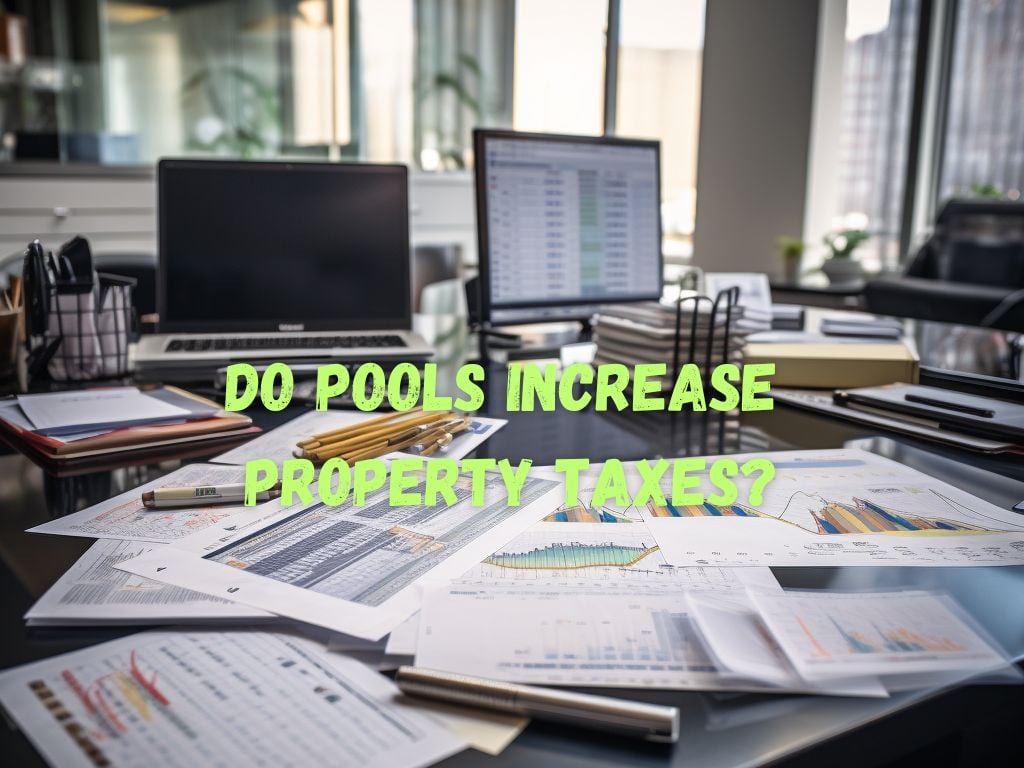Pools are a great way to stay cool during hot summers and also add fun and value to your property.
However, many homeowners who are considering installing a swimming pool are hesitant because they wonder how much it will affect their property taxes.
So, do pools increase property taxes?
Frankly speaking it’s normal to worry about additional expenses when owning a property, so in this article, we will provide you with comprehensive information on whether or not pools increase your property taxes.
How Property Taxes are Calculated
To understand how a pool may affect your property taxes, you need to understand how property taxes are calculated in the first place.
A property tax is a tax assessed on property owners by local or state governments based on the value of the property.
The tax is generally used to fund public services such as schools, parks, and emergency services.
The value of a property is determined by an assessor who looks at various factors such as location, size of the land, and improvements or structures on the property.
The assessor then assigns a dollar value to the property based on these factors.
Once the assessed value is determined, the tax rate is applied to the property value to calculate the taxes owed.
The tax rate is generally determined by local government bodies and varies from area to area.

Do Pools Increase Property Taxes? The Relationship Explained
A swimming pool can increase the value of a property, and in turn, may increase property taxes.
A pool can be seen as a luxury that adds to the overall value of a property, making it a more attractive option for potential buyers.
However, the increase in the property’s value may also lead to a higher property tax assessment.
The extent to which a pool will increase a property’s value and taxes depends on various factors, such as the location of the property, the type of pool, and the size of the pool.
For example, a pool in an area with a hot climate and a higher demand for pools may add more value to the property compared to a pool in a colder area.
Similarly, a larger pool with high-end features and accessories will usually increase the value of a property more than a smaller, basic pool.
Also, the amenities that accompany the pool, such as a poolside deck or cabana, can further increase the value of the property.
How Pools Affect Property Taxes
As previously mentioned, a swimming pool can potentially increase the value of a property, which may lead to increased property taxes.
The increase in property taxes due to a pool will depend on several factors, such as the location, size, type, and design of the pool, as well as local tax policies and regulations.
Here are some additional points to consider when it comes to pools and property taxes:
Local Property Values
The local market impacts the value of your home, including any features such as a pool.
Pools will add more value to a property in areas where they are in high demand, or there is a hot climate, making them a desirable addition to a property.
Conversely, in areas with cold climates, pools may not add as much value, so the impact on property taxes will be minimal.
Size, Type and Design of the Pool
The type of pool, such as above-ground or in-ground, will also affect its value and tax impact.
In-ground pools usually add more value to the property than above-ground pools, so they may lead to higher property taxes.
In addition, more elaborate or high-end pools with advanced features and accessories will add more value and lead to higher property taxes.

Location
The location of the pool can significantly impact its value.
For instance, if the pool is situated in the backyard with excellent views, it might increase the value to you, but it could lower the value of your neighbor’s property and create a dispute or even a lawsuit.
Furthermore, zoning laws and other regulations may impact the location of a pool on your property or your neighbor’s property, impacting property value and taxes.
Maintenance and Upkeep
Proper maintenance and upkeep of a pool are not only essential for the health and longevity of your pool, but they also impact the value of the property.
Well-maintained and clean pools are more attractive to potential buyers and add more value, while poorly maintained or worn-out pools detract from the value of your property.
Local Tax Policies
Local tax policies and regulations vary from place to place, and tax deductions or rebates may be available to pool owners.
For instance, some states in America provide tax incentives to pool owners if they install energy-efficient pool equipment like variable-speed pool pumps.
Therefore, it’s vital to understand the local tax policies in your area to determine how they may impact your property taxes.
Frequently Asked Questions
Will a pool increase my property taxes every year?
No, your property taxes do not increase every year due to the installation of a pool. Property taxes are generally assessed once a year using information from the previous year.
The value of your property can fluctuate, so the amount you pay in property taxes will vary accordingly.
What is the range of property tax increase on a pool?
The range of property tax increase for a pool depends on various factors, such as the size, type, design, its location and the tax policies in your area.
In general, a pool adds around 10% to 30% to the value of a property, which leads to an increase of $750 to $3,000 in annual property taxes.
Does removing a pool decrease property taxes?
The removal of a pool may decrease your property taxes, but it also reduces the value of your property, which could cancel out the tax benefit.
It’s important to consult with a real estate agent or tax professional before making any changes to your property that could affect the value.

Pro Tips for Homeowners
If you are considering installing a pool and want to minimize the impact on your property taxes, follow these pro tips:
Maintain Your Pool Properly
Frequent maintenance and regular cleaning of your pool can help to keep it in good condition, prolong its lifespan, and boost the pool’s value.
To ensure your pool is always in good condition, follow proper maintenance routines such as skimming, vacuuming, cleaning, and chemical balancing.
Install More Energy Efficient Pool Equipment
One of the best ways to minimize the cost and impact of your pool on property taxes is to install energy-efficient pool equipment such as variable-speed pool pumps or solar pool heaters.
Not only can these upgrade your pool to a more sustainable and eco-friendly condition, but they can also reduce your pool’s operating costs, and may lead to discounts or rebates from local tax policies.
Research Local Tax Policies
It’s always helpful to research local tax policies and regulations in your area regarding pool ownership.
Local tax policies and regulations vary from place to place, and you may be eligible for tax deductions, rebates, or abatement options.
Applying for tax rebates or abatement can help to reduce the amount of property tax you owe on the pool.
Consult with a Real Estate Agent or Tax Professional
Professional advice and guidance can be very helpful, especially in complex matters like property taxes or buying property with a pool.
Consult with real estate agents or tax professionals to determine the tax implications of your pool.
They can also provide further information and advice on how to maintain or upgrade your pool to minimize its impact on property taxes while maximizing its overall value.
Monitor Your Property Value
Finally, it is essential to keep track of your property value regularly.
The value of your home may fluctuate with time, and it’s best to keep constructing renovations or upgrades to your property to ensure it remains an attractive and valuable investment.
Knowing what your home is worth will help you predict how much you will be charged in property taxes for owning a pool.

Conclusion
In summary, installing a pool on your property can increase its value and lead to increased property taxes.
However, the extent to which your property taxes will increase will depend on various factors, so it’s essential to plan and research your area to understand the impact of your pool on your property value and taxes.
Following these pro tips, you can enjoy the benefits of having a swimming pool on your property while minimizing the impact on your property taxes.


 Tags:
Tags:










